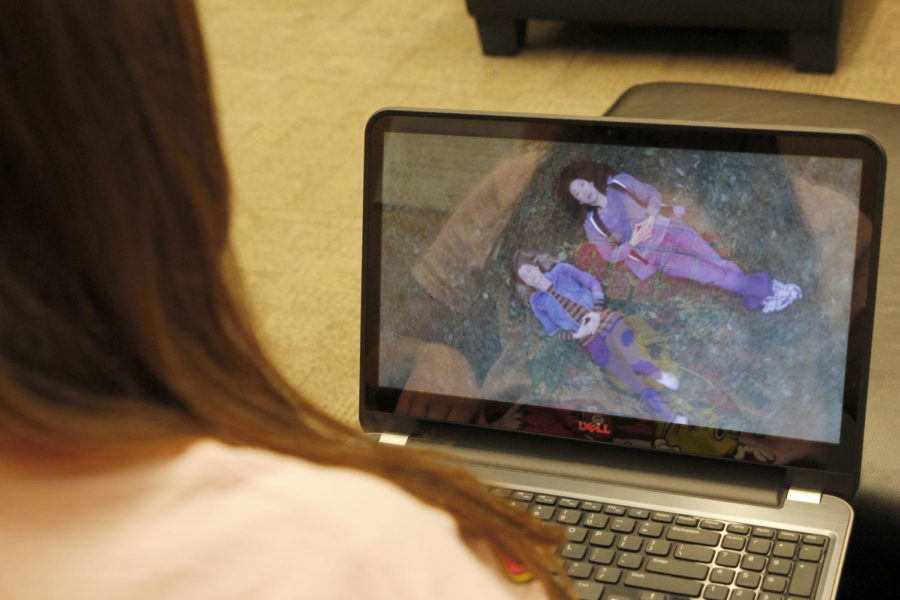Neuendorf: The new classics
Jonathan Krueger/Iowa State Daily
Television shows have become more captivating as literary devices and intricate plot-lines are used to engross viewers. TV shows are a major way that people are able connect socially with people that have similar interests.
December 4, 2013
Right off the bat, let me clarify that I am not a savage wielding a flamethrower with the intention to set ablaze stacks of books. Nor am I thrashing on a street corner somewhere accompanied by a large, white sign with the words “DEATH TO THE WRITTEN WORD” written in the blood of authors past. As a matter of fact, I like books — maybe, dare I say, adore them.
But would you believe me if I told you the greatest storytelling tactics books have to offer — complex symbolism, riveting character development, and entertainingly diverse situations — have transcended past the growingly obsolete paper page or growingly hip e-reader? One word: television. That is where the classic tales of our times are unfolding.
To claim that we are in the golden age of television is like beating a dead horse. But, nonetheless, it remains a truth that the horse is indeed dead. Hot off the heels of Breaking Bad, in the penultimate stages of Mad Men, and with the run of classic literary television shows such as The Sopranos and The Wire just escaping our rear view mirror, we are fortunate to be an audience to such a renaissance.
Is this how the English felt umpteenth years ago standing in the Globe Theatre experiencing a brand new Shakespeare play? Or possibly like hearing a living, breathing Mozart bang a good, sturdy tune out of his piano? A majority of the audience is being entertained, but is not entirely aware of the history taking place right in front of their eyes and ears.
If you haven’t figured it out by now, we aren’t dealing with your grandma’s TV programs. Today’s creme de la creme of series are created with a novelistic approach — a beginning, middle and end all in sight from the get-go. Episodes have become chapters to the season’s book-like installments that make up the overall series.
Yes, there are the inevitable tasty junk food programs thriving on the ratings’ approval to misguide them to umpteenth seasons, choosing a safe, predictable formula over innovation and creativity. But, including the aforementioned, there is the handful with true visionaries at the helm, along with arguably the greatest living writers.
Not so shocking, these shows are plump with prestigious literary devices and those beloved intricate plotlines, worthy of an academia-fueled critical analysis. What exactly am I suggesting? If you guessed teaching and analyzing television shows in our English classes as if they were novels, you would be correct and deserve a gold star. Cue mass hysteria from all those in their caves who still believe dramatic television rots our brains.
In their defense, they probably have statistics that indeed confirm too much television turns our gray matter to jelly. But television is not leaving, instead it is shape-shifting and converging to fit all our devices. It’s not going away, so why not chew on it in healthy portions and turn what could be poisonous in vast quantities into nutritional brain food? All it takes is to switch on the thinker, and where better to sharpen that tool than the classroom?
If you are a dedicated fan to one of the modern classics, you’ve probably implemented these critical thinking skills when trying to solve the mystery or just keeping tabs on the characters’ personalities and actions. But it can and has gone deeper. Breaking Bad’s Walter White’s moral decay and rise to power could spark a million more think-pieces than the already million floating around. It’s just that complex and thematic.
More than all of this, television speedily moves to the forefront of our culture, once again. Both highbrow and lowbrow aficionados can come together to discuss last night’s episode of “Girls” or “Games of Thrones” or “Homeland;” it has become a meeting ground free of elitism.
Television is a fresh, exciting medium still in its formative years, hopefully with the greatest achievements yet on the horizon. And as a fan of art that comes in all shapes and sizes, it feels truly paramount to witness a medium in which all those shapes and sizes are mixed into a cauldron and cooked into these brilliant shows.
In hundreds of years, these will be the classics in which scholars analyze in order to get a grasp on the culture of the past. So why not get a head start while they are still current? And if that’s not your style, just sit back, relax, and watch because this age is truly golden.

















